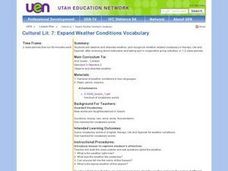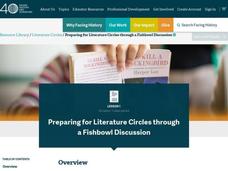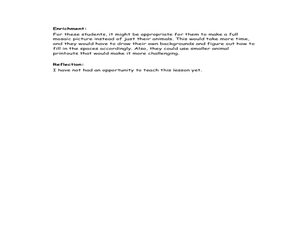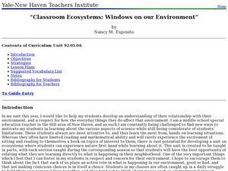Curated OER
Celt Spoon
Students investigate the invention of a celt spoon. They construct their own in order to make observations. This should include the spinning in opposite directions than that which it is sent. The construction instructions are included in...
Curated OER
Science of Money
Students observe oxidation reaction in the lab using copper pennies. In this chemistry activity, students examine a $1 dollar bill and record their observations. They explain how to identify counterfeit money using the iodine test.
Curated OER
Investigating Local Ecosystems
Students investigate the habitats of local plants and animals. They explore some of the ways animals depend on plants and each other. Students observe living organisms in a local ecosystem and create detailed drawings and descriptions...
Curated OER
Discovering Wind
Pupils discuss what they think wind is before listening to Pat Hutchins, The Wind Blew. Next, the go on a wind walk outside to look for signs of wind using their senses. As they walk, they teacher scribes their observations. The next...
Curated OER
The Contest Between the Sun and the Wind
Students investigate the relationship between the sun and wind. For this reading comprehension lesson, students read the book The Contest Between the Sun and the Wind, and observe the effect of the Sun and wind on our planet....
Curated OER
Photograph / Special Object Worksheet
In this fieldwork application activity, students utilize a photo or object that they brought to class to study. Then they follow the directions on the activity and interview a classmate, using the 13 questions, about his or her photo or...
Curated OER
Reading and Using a Recipe
Young scholars explore how to follow a simple recipe and explain directions to another person.
Curated OER
Cultural Lit. 7: Expand Weather Conditions Vocabulary
Second graders study and observe weather. They identify weather related vocabulary in Navajo, Ute, Spanish and English after working in direct instruction and small group activities.
Curated OER
A Tail to Tell
Young scholars observe populations of Lumbriculus to discover some of the adaptations that allow them to live successfully along the shores of ponds and marshes. They also design and perform experiments to test proposed hypotheses for...
Curated OER
Forces
Fourth graders review the meaning of Newton's 3rd Law and discuss the forces that are acting on a book setting on a table. They draw a diagram of the book on the table and use arrows to illustrate the direction the forces are acting.
Curated OER
Cranes, Crosswalks, and Big Gulps
Students watch a video and answer questions based on wildlife jobs. In this wildlife lesson plan, students learn that biologists don't just play with animals but that there is a lot of study involved.
Curated OER
Seeing Eye "Buddies"
Third graders observe a variety of sights within their schoolyard habitat and sitting quietly back-to-back with a partner describe what they see. The partner sketches the observations, 3rd graders compare drawings with the object described.
Curated OER
Jewish Culture Through Food Recipes
Young scholars engage in studying Jewish culture through the experience of tasting and eating different foods. They answer key questions that are used to guide the activity. The foods of Americans is contrasted with the Jewish foods.
Curated OER
Chemistry: Mini-Volcanoes
Students observe an experiment using common household chemicals to simulate a volcanic eruption. In small cups, they follow the teacher's instructions to make their own volcanoes. After watching a Brain-pop video, students complete...
Facing History and Ourselves
Literature Circles: Preparing for Literature Circles through a Fishbowl Discussion
Young scholars examine the attributes of productive conversations. For this fishbowl discussion lesson, students observe a modeled discussion of a literature circle. Young scholars watch a discussion of "The Bear That Wasn't" and note...
Curated OER
Art Lesson Synthesis
Students observe animals and complete an art project. In this interdisciplinary lesson, students define the word mosaic, create animal mosaics, and share their creations with the class. As students explain their art to the class they...
Curated OER
Atlas Scavenger Hunt
Young scholars discover what type of information in an atlas by participating in a scavenger hunt. With a partner, they try to find the answers to many questions as possible. They exchange their papers with another partner group and...
Curated OER
Chapter 3 - Worksheet 3E - Functions
In this function worksheet, students observe graphs and determine if the function of the graph is odd or even. They find the inverse of a function and determine the horizontal asymptote of a function. This four-page worksheet contains...
Curated OER
Using Chromatography to Identify Unknowns
Young scholars are introduced to the concept of chromatography. They practice using new vocabular and observing experiments. They answer discussion questions to end the lesson.
Curated OER
Introduction to Mendelian Genetics using Fiction
Students investigate Mendelian Genetics by studying the history of Mendel and what it was like to be a 19th century scientist. They read a pieces of fiction during this investigation.
Curated OER
Sound Waves
Sixth graders discover how sound is made from vibration and moves in all directions from the source in waves. They see that sound waves can be "seen" if they are translated into light. An excellent experiment is imbedded in this...
Curated OER
Classroom Ecosystems: Windows on our Environment
Students in a special education classroom examine their relationship with the environment. As a class, they examine the concept of a web of life and create their own classroom ecosystem. In groups, they record their observations and...
Curated OER
Writing About Outdoor Activities
Students discuss what they like about parks and make a list of different things they like to do there such as swing, run, play ball, ride a bike, or go on a hike. They discover the locations of some examples of National Parks and that...
Curated OER
Air Has Pressure
Seventh graders analyze evidence about particles and the exertion of air pressure. They observe an experiment with a hard boiled egg. fire and a bottle to discover the heating, cooling, and speed of air particles. They write explanations...























